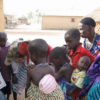Botswana 2013-2014 Health Accounts: Main Report
Health Finance, Home Page Map, Publications, Resource Tracking (NHA, SHA), Where We WorkResource Type: Report Authors: Botswana Ministry of Health and Wellness Published: December 2016 Resource Description: This report describes the key findings and policy implications of the Botswana health accounts (HA) estimation for fiscal year April 2013 through March 2014. Previously Botswana completed two rounds of HA; the first round, in 2006, covered fiscal years 2000/2001, 2001/2002, […]




